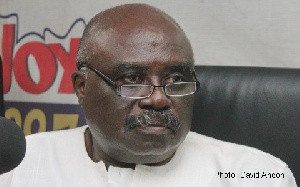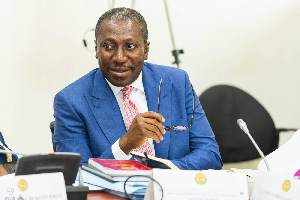Two events that engaged the attention of many of us since the beginning of this year, namely: 1) The Petition against the declaration of John Mahama as the President of Ghana in the 2012 Presidential elections, and 2) The nomination and election of Mayors and District Chief Executives for the Metropolitan, Municipal and District Assemblies (MMDAs).
The two have exposed the dichotomy, incoherence and near futility of our collective attempts to SQUARE THE CIRCLE of the Partial Democracy bequeathed to us by the framers of the 4th Constitution of the Republic of Ghana.
One school of thought suggests that all of our political and socio-developmental challenges of the 4th Republic can be heaped on the WINNER TAKES ALL format of our Election system. A second school posits that if Chief Executives were elected by the people instead of being appointed by the President, it would lead to greater local accountability on both abuse of political office and wanton dissipation of the public purse. On the face it, the two positions do not appear to be intertwined; indeed it can be argued that they can provide the sum of the parts being greater than the whole benefits for our current democratic dispensation.
Unfortunately, as with most things that look perfect on paper, the problems thrown up by the two events can be traced to the wide gulf between the intent and the reality in the opening words of our Constitution: (1) The Sovereignty of Ghana resides in the people of Ghana in whose name and for whose welfare the powers of government are to be exercised in the manner and within the limits laid down in this Constitution.”
The origin and prosecution of the Election Petition identified the spanner in the works that punctured the first hole in our hitherto assumed to be perfect democratic system. Swearing in John Mahama as President of Ghana when the legitimacy of his electoral victory was being challenged is a most incomprehensible and dastardly form of my “SHUTTING THE GATES AFTER THE HORSE HAS BOLTED” back to front logic that afflicts much of the way we do things in Ghana.
Alas, we cannot heap blame onto John Mahama’s head. The reason that allows the folly is founded and entrenched in the Laws of Ghana. Likewise the perverse logic that allows a seemingly “illegitimate President” John Mahama to appoint District Chief Executives is also founded in the laws of Ghana. So none of us can accuse John Mahama of JUMPING THE GUN. All he is doing is going by the BOOK.
Perverse as it may seem, the ongoing conundrum does not pose a real and present danger to our lives and freedoms, even as the whole exercise has managed to emasculate the conduct of business commerce and everyday life of Ghanaians, including the inexplicable spate of fires in the main centres of enterprise for most of our folks, life limps along. From where I sit the more fundamental problem is deeply rooted in our Constitution. It is exacerbated by our own psyche and our own psyche of wanting to eat our cake and have it attitudes to the core issues and realities of modern Democratic systems of governance.
We heap blame on the “winner takes all of the spoils of victory” in the same breath as we make a strong commitment to the framework of competing for the people’s mandate within the framework and on the platform of political parties using their differing ideologies to shape their prescriptions to improve our lives and wellbeing. We like to shout from the rafters about the evils and dangers of “winner takes all”, as alien to our culture and norms without offering the “HOWS & OUTCOMES” of the indigenous alternatives to the necessarily adversarial nature of the competition for ideas and competitive elections inherent in and underpinning modern democratic governance.
We accept that we have a choice to be convinced as to whether going to Kumasi is best via Koforidua or Suhum, and then having been persuaded as to the best route, we turn round and say”Ah but we should all sit together an decide if we can beat a path in the bush and create a third route which avoids allowing the winning political party to demonstrate that its proposal for getting us to Kumasi is indeed the best. Whilst it is true the driver of winning Dutong bus can poach an “aplanke” and a more inspirational “adurowura” from the losers to do the journey, it is not the same and can never be justified that having expressed a preference between Suhum and Koforidua, the fundamental base of competing ideas and choice should be jettisoned for some national consensus that nobody has as yet articulated with any conviction or practicality.
The more curious absurdity of the opponent of the “first past the winning post” principle is that they profess and argue passionately for the extension of partisan political competition to the grassroots levels of our governance, including a passionate case for the direct elections of Metropolitan and District Chief Executives. Alas, the irony and hypocrisy of the commitment to competitive local elections is to be found in the fact that both the NDC and the NPP have committed themselves to competitive local elections, especially that of Chief Executives, when in opposition, only to jettison the commitment as soon as they win national elections and taste the awesome power of the status quo.
Ghana’s constitution has legitimized and institutionalized GOVERNMENT BY A DICTATOR which has been shrouded in the niceties of the language and format of modern democratic systems> We have prioritized and confused “KABI NA MENKA BI” (FREE EXPRSSION AND EXCAGE OF DIVERGENT VIEWS) with the absolute and essential requirements to institute implementable and verifiable CHECKS & BALANCES on the awesome powers bestowed on our President to act as he /she pleases.
Our Constitution has given the full and absolute power to rule over us to the President. Article 58 (1) states unambiguously that:”The executive authority of Ghana shall vest in the President and shall be exercised in accordance with the provisions of this Constitution”. For the avoidance of doubt, the dictatorial nature of the President’s powers are reinforced by 58(2) which states” (2) The executive authority of Ghana shall extend to the execution and maintenance of this Constitution and all laws made under or continued in force by this Constitution” 58(4) removes all ambiguity as to who is in charge of our lives.
(4) Except as otherwise provided in this Constitution or by a law not inconsistent with this Constitution, all executive acts of Government shall be expressed to be taken in the name of the President.
To rub salt into the wound of the disguise of Dictatorial rule masquerading as democracy, the President is given the absolute and exclusive power not only to dip their hands into the public purse of Ghana, but more importantly not to allow anybody else, including Parliament. to use our money without the approval of the President.
“Parliament shall not, unless the bill is introduced or the motion is introduced by, or on behalf of, the President – (a) proceed upon a bill including an amendment to a bill, that, in the opinion of the person presiding, makes provision for any of the following – (i) the imposition of taxation or the alteration of taxation otherwise than by reduction; or (ii) the imposition of a charge on the Consolidated Fund or other public funds of Ghana or the alteration of any such charge otherwise than by reduction; or (iii) the payment, issue or withdrawal from the Consolidated Fund or other public funds of Ghana of any moneys not charged on the Consolidated Fund or any increase in the amount of that payment, issue or withdrawal;(Article 108)
When it comes to the grassroots level, the pervasive power of the President looms very large too. (1) There shall be a District chief Executive for every district who shall be
appointed by the President with the prior approval of not less than two-thirds
majority of members of the Assembly present and voting at the meeting( Article 243) (2) The District Chief Executive shall - (c) be the chief representative of the Central Government in the district. Who is central government? of course, none other than the President, in whom is reposed the executive powers of Ghana.
The import of the powers of the President to appoint KVIP money collectors and decide exclusively how to spend our money put a real dampener on the notion of Parliament or anybody else being able to exercise control or checks and balances on how our President presides over us once he has won elections and been declared “THE ABSOLUTE MONARCH of Ghana.
Our worries about WINNER TAKES ALL should therefore be less about seeking CONSENSUS ON COMMON POLICIES AND POSITIONS, and more on PUTTING A BRAKE ON THE AWESOME POWERS WE HAVE GIVEN TO OUR PRESIDENT TO DO AS HE OR SHE PLEASES. The former is an anathema to the principles and practice of modern democratic governance, which is founded on competing ideologies and ideas by political parties; whilst the latter is the core of mechanism that defends and protects the people’s interest after they have entrusted the powers of governance into the hands of an elected President.
Unfortunately, the much taunted Constitutional Review Process completely side-stepped the need to get to the heart of the matter of the excessive and awesome powers of our elected dictator. This gargantuan omission was probably due to the fact that the CRC was a creation of the President and its deliberations were almost certainly shaped by the Executive authority. Fortunately, it is Parliament which must push the process of reviewing our constitution forward from now on. As the representatives elected by the people at the grassroots to keep watch over the “ABSOLUTE MONARCH PRESIDENT”, I trust that Parliament will grab this opportunity to do right by WE THE PEOPLE &BY ITS OWN SELF. HOW?, will be the subject of a future essay.
General News of Friday, 9 August 2013
Source: Charles Wereko-Brobby
Wereko Brobby Writes: The president takes all
Entertainment












